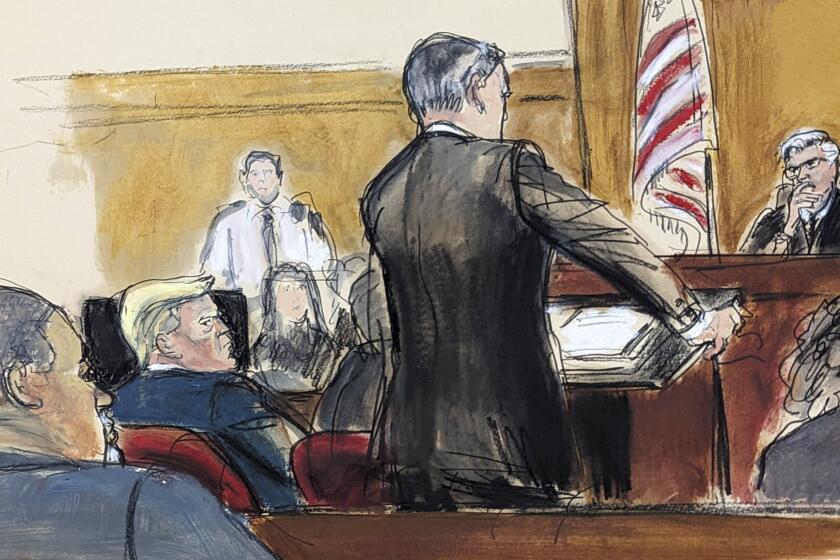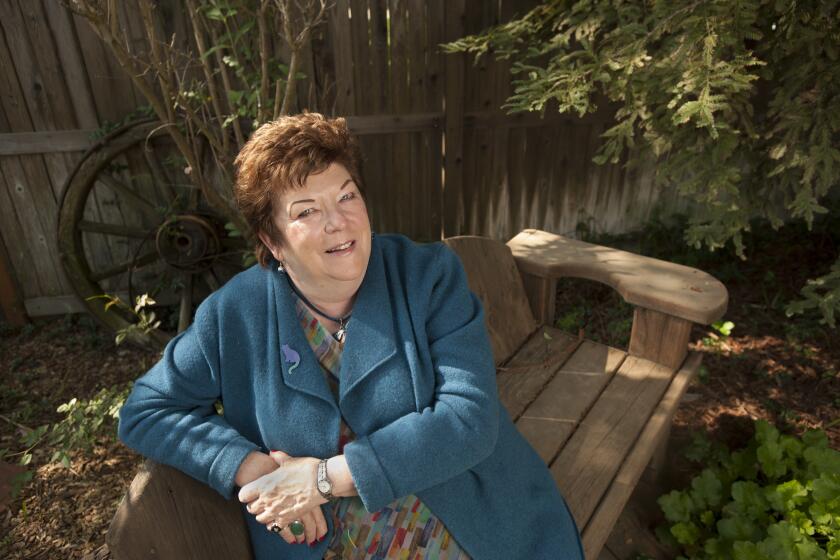Hard numbers on candidates’ soft spots
Cut to the core of the contest for California governor and you’ll find that each candidate has one very vulnerable weak spot.
For Democrat Jerry Brown, it’s his old age.
For Republican Meg Whitman, it’s her shameful record of not voting in elections.
Career politician? Business background? Backed by labor? Gender? None are very big factors, according to the nonpartisan Field Poll.
Field’s latest statewide survey shows that Atty. Gen. Brown and former EBay chief Whitman are in a virtual dead heat roughly four months before the November election: Brown 44%, Whitman 43%.
Most intriguing is the poll’s measuring of the candidates’ strengths and weaknesses.
Poll director Mark DiCamillo offered likely voters a long list of characteristics — or “attributes” — that fit one or both of the candidates, without mentioning their names. He asked people whether they would be more likely or less likely to vote for a candidate with such a characteristic. Then he calculated the net positive or negative effect of each trait.
The biggest negative, by far, was if a candidate for high office “hasn’t voted in many past statewide elections.” That fits Whitman, who has acknowledged and apologized for a dismal voting record. Opponents accuse her of not voting during a 28-year span.
“I was focused on raising a family, on my husband’s career and we moved many, many times,” she told reporters last year in her only public explanation, adding, “It is no excuse. My voting record, my registration record, is unacceptable.”
Since then, Whitman hasn’t even tried to explain, merely conceding that she should have voted and didn’t.
Among people interviewed by the Field Poll, an odd 4% actually said they’d be more likely to vote for a candidate who had seldom cast a ballot. But 54% said they’d be less likely to.
People turned off by non-voting include many Republicans and Whitman supporters, nearly 40% each. And they’re especially people in the 30 to 50 age group, many of whom presumably also are — as Whitman was — “focused on raising a family,” etc., but still find time to vote.
The most troublesome attribute for Brown is his age, 72. It’s a net 34% negative, with 37% saying they’d be less likely to vote for a candidate over 70.
Interestingly, Republicans seem more tolerant of age than Democrats. Only 30% of Republicans said they’d be less likely to vote for a septuagenarian. But 42% of Democrats would be less inclined; also 40% of Brown’s own supporters.
They “must think that your mental capabilities and stamina are hindered,” DiCamillo says.
As for voting, the pollster says, voters feel it is the “minimum expected of civic participation. It’s something that voters value, and it applies all the way up to CEOs of major corporations. They should be participating in democracy, and when they’re not, voters look at it dimly.
“CEOs always say, ‘I’m so busy. I’ve got 15 things on my desk at any one time.’ But everyone has to prioritize in life.”
When the election approaches, he adds, voters will weigh the candidates’ other characteristics, such as trustworthiness, and their positions on issues. But now, “voters have only the vaguest notion of where the candidates stand, and these attributes really are very influential.”
Veteran Democratic political strategist Darry Sragow has managed campaigns for a businessman-turned-politician with a poor voting record (Al Checchi) and a 72-year-old (the late U.S. Sen. Alan Cranston).
“The failure to vote in elections,” Sragow says, “confirms to voters their suspicions that if you’re someone who was very successful in business and has no political experience and you suddenly decide to run for major office, you’re a dilettante who really isn’t serious about governing. You’re bored and want something to keep you busy.”
“On the age thing,” Sragow continues, “what voters are concerned about is not your chronologic age but your political age. It’s how you think, in this case about the job of being governor.
“If you are over 70 and spend a lot of time talking about the good old days and evoking your record from the past, you really should not bother to run. Voters do not want to hear about the past. They want to hear about what you plan to do looking forward.”
And maybe why Brown even covets the job again after having served two terms as governor four decades ago?
Sragow thinks that age is Brown’s “biggest challenge as a candidate.”
Brown’s campaign manager, Steve Glazer, insists he isn’t worried. “We don’t consider it to be any issue whatsoever,” he says, adding that voters will choose the candidate they believe “has the experience and know-how to be a good governor.”
Rob Stutzman, Whitman’s communications strategist, says he also doesn’t fret about her voting record. She’s apologized, he notes, “and our research shows people act favorably to that.”
He quips: “How does Brown apologize for his age? I’m not sure that he can.”
Brown doesn’t have to. Aging is a fact of life. Not voting is a failure of citizenship.
More to Read
Get the L.A. Times Politics newsletter
Deeply reported insights into legislation, politics and policy from Sacramento, Washington and beyond. In your inbox three times per week.
You may occasionally receive promotional content from the Los Angeles Times.







